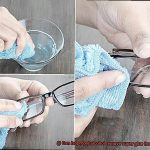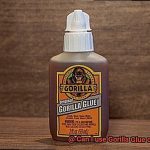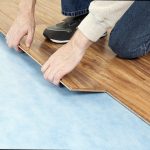Have you ever lost a post crown and thought about taking matters into your own hands by gluing it back on yourself? It may seem like a quick and easy solution to save time and money, but before you reach for the glue, there are some important things you should know.
Firstly, it’s essential to understand the purpose of a post crown. This type of crown is used to restore a damaged tooth that has undergone a root canal. The crown sits on top of a post that is inserted into the tooth to provide additional support and strength. Typically, a dentist will be responsible for placing the post crown and making any necessary adjustments.
Attempting to glue your post crown back on yourself can result in several negative consequences. For example, if you use the wrong adhesive, it can damage your tooth, cause decay or even lead to an infection. Additionally, if the crown is not placed correctly or fully seated, it can cause pain and discomfort or even crack or break the weakened tooth.
In this blog post, we will explore why trying to glue your post crown back on yourself is risky and explain why seeking professional dental care is crucial. We’ll also discuss the benefits of having a post crown, what steps to take if it falls out and what options are available for repairing it. So let’s dive in together and learn more about how to handle any issues with your post crowns like pros.
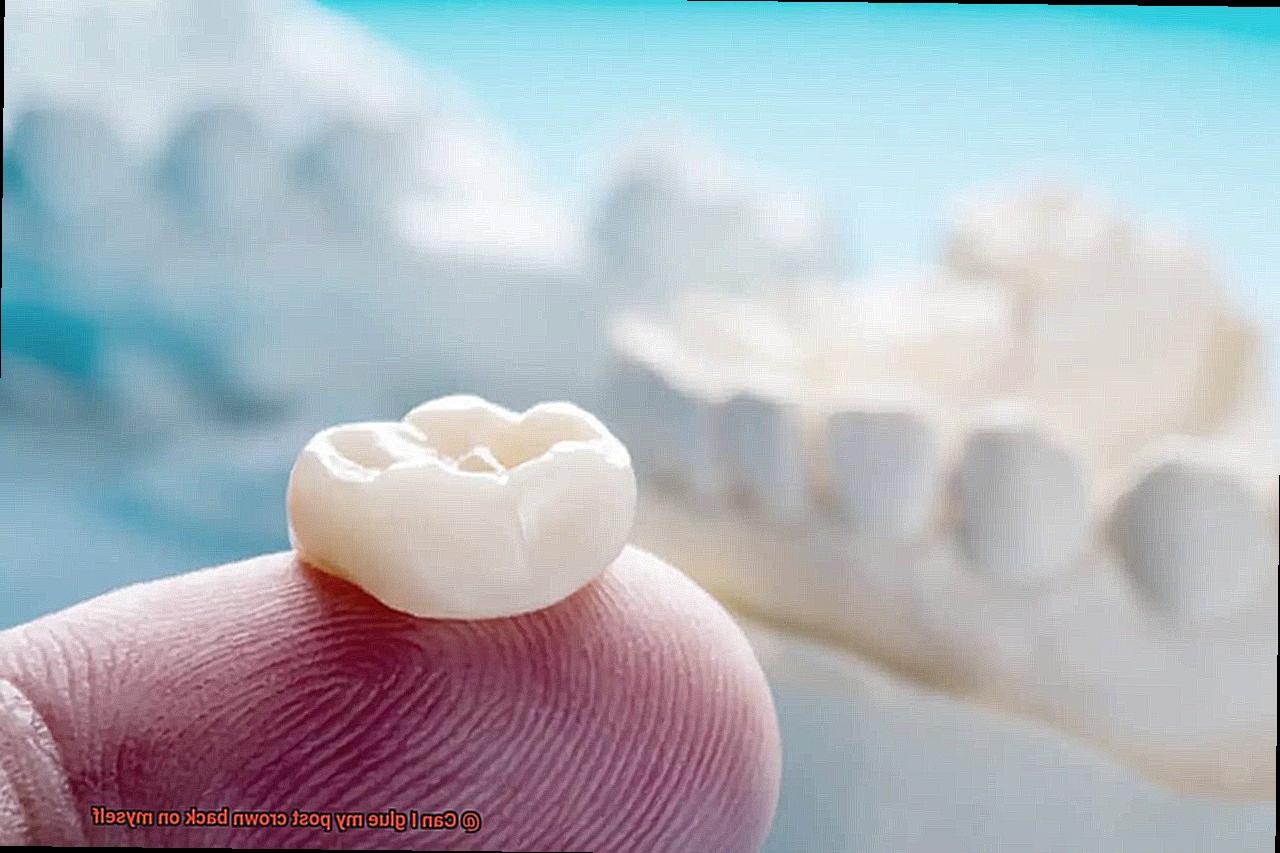
What is a Post Crown?
Contents
A post crown may be the solution for you. This dental restoration consists of two parts: a metal or fiber post and a custom-made cap. The post is inserted into the root canal of the tooth, while the crown is placed over the remaining portion of the tooth to protect and strengthen it.
Post crowns are designed to be durable and long-lasting, and they can be made from different materials such as porcelain, ceramic, or metal alloys. Your dentist will work with you to choose the right material that meets your individual needs and preferences.
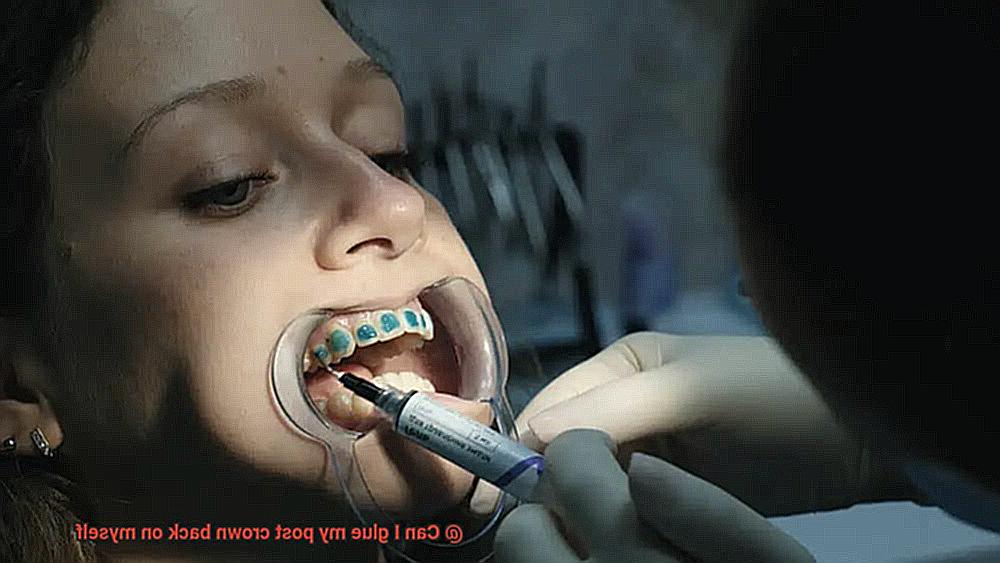
It’s crucial to remember that trying to glue your post crown back on yourself is not recommended. Doing so can lead to further damage to either your tooth or the crown itself. It’s best to seek professional help from a licensed dental professional who has experience in handling such situations.
Your dentist or dental technician has the necessary tools and expertise to ensure that your post crown is reattached correctly and securely. They will also advise you on how to properly clean and maintain your post crown, preventing bacteria buildup and decay.
Why You Should Not Glue Your Post Crown Back On Yourself
While it may seem like a cost-effective solution, this DIY approach can lead to a host of problems in the long run. As an expert in the field, I urge you to consider the following reasons why you should avoid taking matters into your own hands.
Firstly, dental work requires specialized tools and materials that are not readily available to the average person. Opting for household adhesives instead of professional-grade products can cause further damage and complications, leading to more extensive and expensive dental work down the line.
Secondly, if the post crown is not correctly aligned or seated on the tooth, it can cause discomfort and even pain. A qualified dentist has the necessary expertise and training to ensure that the post crown is placed correctly and snugly on the tooth, providing maximum comfort and preventing further complications.
Finally, attempting to fix dental issues on your own can result in irreversible damage or even tooth loss. If the post crown is not properly attached, it can lead to more damage to the tooth structure or surrounding gums, requiring more extensive dental procedures in the future.
Potential Risks of Glueing a Post Crown Back On Yourself
While it may seem like a quick and easy fix to avoid a trip to the dentist, it’s important to understand the potential risks involved. As an expert in the dental field, I highly recommend that you resist the urge to take matters into your own hands.
One of the most common risks associated with self-gluing a post crown is using the wrong type of adhesive. It’s important to note that household adhesives such as superglue or epoxy are not designed for use in the mouth and can cause significant damage to your teeth and gums. Using these adhesives can lead to further damage and complications, which may require professional intervention.
Another risk associated with self-gluing a post crown is the possibility of further damaging the tooth or crown. If you do not properly clean and prepare the tooth before attaching the crown, you run the risk of causing additional damage that may require more extensive treatment down the line. This can lead to discomfort, pain, and even irreversible tooth loss.
In addition to these risks, there is also a risk of infection if you do not properly sterilize your tools and equipment before attempting to glue your crown back on. If you introduce bacteria into your mouth during the gluing process, you could end up with a serious infection that requires medical attention.
How to Properly Attach Your Post Crown
How to Properly Attach Your Post Crown: A Step-by-Step Guide
Dealing with a loose or fallen-out post crown can be frustrating and uncomfortable. While it’s best to seek professional help from a dental expert, we understand that some people may want to try attaching their post crown themselves. If you’re determined to do it yourself, here’s a step-by-step guide to ensure that it’s done correctly:
Clean the Area Thoroughly
Before attaching your post crown, it’s essential to make sure the area is clean and free from any debris or bacteria. Use dental floss and toothpaste to gently clean the area in circular motions. Dry the area completely using a clean cloth or tissue. This will ensure that the adhesive or cement will attach properly.
Gather the Right Tools
To properly attach your post crown, you’ll need a few tools such as dental floss, toothpaste, and crown adhesive. Make sure you have these on hand before starting the process.
Apply Crown Adhesive Carefully
Once the area is clean and dry, apply a small amount of crown adhesive or dental cement to the inside of the crown. Be sure to follow the instructions on the adhesive carefully. Using the correct type of adhesive or cement is crucial in ensuring that your tooth or crown won’t be damaged.
Gently Place Crown onto Post
Carefully place the crown onto the post and hold it in place for a few seconds until the adhesive or cement sets. Avoid chewing on the crown for at least 24 hours after attachment to allow the adhesive or cement to fully set.
Seek Professional Assistance if Necessary
Even if you follow these steps correctly, there’s no guarantee that your post crown will be securely attached. It’s important to remember that post crowns are designed to be attached by a dental professional using specialized equipment and techniques. If your post crown has come loose or fallen out, it’s best to make an appointment with your dentist as soon as possible to have it reattached properly.
Cleaning and Maintenance of Post Crowns
Post crowns are commonly used to repair damaged or root canal-treated teeth. These restorations consist of a metal post inserted into the tooth’s root canal and a crown cemented onto the post. To ensure the longevity of your post crown, it is crucial to practice good oral hygiene habits.
First and foremost, brushing and flossing regularly are essential. Pay extra attention when brushing to ensure that all areas surrounding the post crown are cleaned thoroughly. It is also recommended to use an antibacterial mouthwash to kill bacteria present in your mouth and prevent potential infections or decay from forming around the post crown.
To avoid any damage, it is important to steer clear of hard or sticky foods that can harm your post crown. Additionally, if you participate in contact sports or activities that may lead to injury, wearing a protective mouthguard can help minimize harm.
If you notice any issues with your post crown, such as looseness or damage, seeking professional dental care immediately is crucial. Attempting to fix it yourself can lead to further damage and complications.
Tips for Taking Care of Your Post Crowns
You’re one step closer to a healthy and functional mouth, but taking care of your new dental work is crucial to ensure its longevity and effectiveness. Here are five tips to help you maintain your post crowns and enjoy a healthy, beautiful smile for years to come.
Brush and floss regularly
Your post crowns require regular brushing and flossing just like your natural teeth. Use a soft-bristled toothbrush and non-abrasive toothpaste to brush your teeth twice a day. Floss once a day to remove any food particles that may have gotten stuck between your teeth and crown.
Avoid hard, sticky, or chewy foods
Hard, sticky, or chewy foods can damage or dislodge your post crowns. Avoid chewing on ice, hard candy, popcorn kernels, and other hard or sticky foods. Opt for softer options like steamed vegetables or scrambled eggs instead.
Wear a mouthguard
If you play sports, wear a mouthguard to protect your post crowns from damage caused by impact. A custom-made mouthguard from your dentist provides the best protection.
Visit your dentist regularly
Regular dental check-ups can detect any problems with your post crowns early on. Your dentist can ensure that your crowns are in good condition and make any necessary adjustments. They may also recommend a professional cleaning to remove any buildup around the crown.
Don’t use your teeth as tools
Using your teeth as tools to open bottles or tear packages can damage your post crowns or even cause them to fall out. Instead, use scissors or a bottle opener to avoid putting unnecessary pressure on the crown.
By following these tips, you can ensure the longevity of your post crowns and maintain excellent oral health for years to come. However, if you do experience any issues with your post crowns such as looseness or discomfort, it’s important to schedule an appointment with your dentist as soon as possible. Trying to fix the crown yourself could cause further damage or complications, so leave it to the professionals.
7DeCokdb-RA” >
Conclusion
In conclusion, it’s not recommended to attempt gluing your post crown back on yourself. Although it may seem like a quick fix, there are important factors to consider before taking matters into your own hands. Post crowns are designed for restoring damaged teeth that have undergone root canal treatment and require specialized tools and materials that aren’t readily available to the average person.
If you try to glue your post crown back on yourself, you run the risk of using the wrong adhesive or causing further damage to your tooth or crown. Additionally, if the post crown isn’t correctly aligned or seated on the tooth, it can cause discomfort and even pain. Ultimately, attempting DIY dental work can result in irreversible damage or even tooth loss.
To ensure a safe and secure reattachment of your post crown, seek professional help from a licensed dental professional with experience handling such situations. Your dentist has the necessary tools and expertise to handle this type of issue properly. They’ll advise you on how to clean and maintain your post crown properly, preventing bacteria buildup and decay.
By following proper cleaning and maintenance techniques for your post crowns – such as brushing regularly, avoiding hard or sticky foods, wearing a mouthguard during sports activities, visiting your dentist regularly – you can prolong their longevity while maintaining excellent oral health for years to come.




